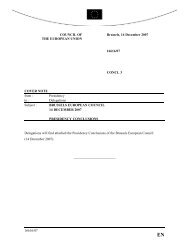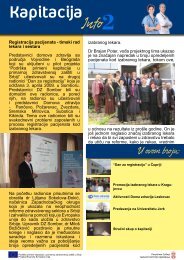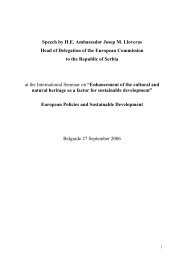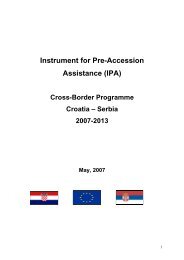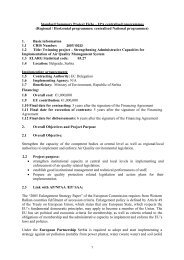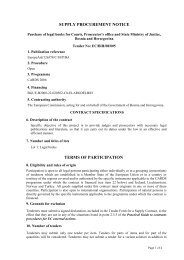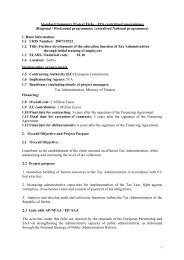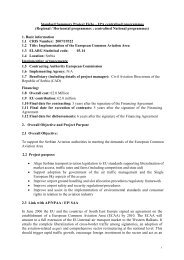Standardised System of Training Judiciary - European Commission
Standardised System of Training Judiciary - European Commission
Standardised System of Training Judiciary - European Commission
You also want an ePaper? Increase the reach of your titles
YUMPU automatically turns print PDFs into web optimized ePapers that Google loves.
Standard Summary Project Fiche – IPA centralised programmes<br />
(Regional / Horizontal programmes ; centralised National programmes)<br />
1. Basic information<br />
1.1 CRIS Number: 2007/19322<br />
1.2 Title: Standardized <strong>System</strong> for <strong>Judiciary</strong> Education and <strong>Training</strong><br />
1.3 ELARG Statistical code: 01.23<br />
1.4 Location: Serbia<br />
Implementing arrangements:<br />
1.5 Contracting Authority – <strong>European</strong> <strong>Commission</strong><br />
1.6 Implementing Agency: N/A<br />
1.7 Beneficiary (including details <strong>of</strong> project manager): Ministry <strong>of</strong> Justice<br />
Financing:<br />
1.8 Overall cost: € 2M<br />
1.9 EU contribution: € 2M<br />
1.10 Final date for contracting: 3 years after the signature <strong>of</strong> the Financing Agreement<br />
1.11 Final date for execution <strong>of</strong> contracts: 5 years after the signature <strong>of</strong> the Financing<br />
Agreement<br />
1.12 Final date for disbursements: 6 years after the signature <strong>of</strong> the Financing Agreement<br />
2. Overall Objective and Project Purpose<br />
2.1 Overall Objective:<br />
To strengthen the efficiency and transparency <strong>of</strong> courts and prosecutorial <strong>of</strong>fices, by<br />
establishing a new system <strong>of</strong> appropriate training before and during appointment <strong>of</strong> personnel<br />
to judicial functions<br />
2.2 Project purpose:<br />
1) Appropriate training (practical and theoretical) provided by the Judicial Academy for<br />
lawyers that are entering judicial pr<strong>of</strong>essions based on EU standards and criteria;<br />
2) Continuous training <strong>of</strong> judges and prosecutors provided by the Judicial Academy in order<br />
to increase their pr<strong>of</strong>essional capacities and strengthen the overall efficiency <strong>of</strong> the judicial<br />
system.<br />
2.3 Link with AP/NPAA / EP/ SAA<br />
The <strong>European</strong> Partnership requires that Serbia ensures full legal and practical safeguards<br />
for independence and efficiency <strong>of</strong> the courts, including the reform <strong>of</strong> the current system <strong>of</strong><br />
appointment procedure; implement legislation on mandatory training and ensure budgetary<br />
sustainability <strong>of</strong> the Judicial <strong>Training</strong> Centre. (pp 14)<br />
The SAA (Article 80 Reinforcement <strong>of</strong> institutions and rule <strong>of</strong> law) underlines the<br />
importance <strong>of</strong> consolidating the rule <strong>of</strong> law and the reinforcement <strong>of</strong> institutions at all levels<br />
in the areas <strong>of</strong> administration in general and law enforcement and the administration <strong>of</strong> justice<br />
in particular.<br />
1
Institutionalizing a well-functioning and efficient judiciary as well as law enforcement<br />
agencies are key elements to be supported through the SAP. To achieve this, the SAP, among<br />
other measures, promotes reforms to enhance transparency, efficiency, effectiveness and<br />
accountability in the JHA sector. These steps are critical in order to build citizens’ trust in<br />
judicial and police institutions.<br />
2.4 Link with MIPD<br />
The main priorities and objectives in the area <strong>of</strong> the rule <strong>of</strong> law under the MIPD 2007-2009<br />
include strengthening <strong>of</strong> the wider judicial system through <strong>Standardised</strong> <strong>System</strong> for Education<br />
and <strong>Training</strong>, supporting the new Juvenile Justice Law and independence <strong>of</strong> the Serbian Court<br />
<strong>System</strong>.<br />
2.5 Link with National Development Plan (where applicable)<br />
N/A<br />
2.6 Link with national/ sectoral investment plans(where applicable)<br />
In the National Investment Plan <strong>of</strong> the Republic <strong>of</strong> Serbia for 2007 2.1 MEUR is allocated for<br />
the reconstruction <strong>of</strong> National Judicial <strong>Training</strong> Institute (Judicial Academy) building.<br />
The Serbian <strong>European</strong> Integration Strategy identifies the following priorities to meet the<br />
<strong>European</strong> Partnership standards in judicial reform<br />
• Improve recruitment and promotion <strong>of</strong> judges and public prosecutors in order to open<br />
these pr<strong>of</strong>essions to all who meet the required conditions;<br />
• Achieve transparency in the procedure <strong>of</strong> recommending and electing judges and<br />
public prosecutors;<br />
• Establish continuous education as an obligation for judges and public prosecutors;<br />
developing assistant judicial pr<strong>of</strong>essions and their education (court executives, public<br />
notaries, bankruptcy managers, court summonses, etc.).<br />
3. Description <strong>of</strong> project<br />
3.1 Background and justification:<br />
To date steady progress has been made in the reform <strong>of</strong> the Serbian Judicial <strong>System</strong>.<br />
Significant challenges still remain, particularly in meeting demands <strong>of</strong> the new legislation,<br />
improving the transparency <strong>of</strong> judicial procedure, reducing the scale <strong>of</strong> backed up caseloads<br />
and increasing the efficiency <strong>of</strong> court proceedings. The Ministry <strong>of</strong> Justice has been actively<br />
seeking to address several <strong>of</strong> these issues through legal reforms, new procedural codes and<br />
computerisation. An important step has been made in the implementation <strong>of</strong> the National<br />
Judicial Reform Strategy<br />
The National Judicial Reform Strategy is based on four key principles: independence,<br />
transparency, accountability and efficiency. Through the implementation <strong>of</strong> these principles,<br />
the Strategy is designed to facilitate the EU association process by ensuring respect for the<br />
standards and norms set our for the performance <strong>of</strong> judicial functions. Judicial training plays<br />
an important role in the successful implementation <strong>of</strong> the strategy. Support under this fiche is<br />
directed to the successful operation <strong>of</strong> the Judicial <strong>Training</strong> Academy.<br />
2
Over the last several years, responsibility for judicial education and pr<strong>of</strong>essional training has<br />
largely been assumed by the Judicial <strong>Training</strong> Centre (JTC). Currently there are no developed<br />
and comprehensive curricula for judicial and staff training. In general, current training efforts<br />
are inadequate, both for new as well as experienced judicial staff. The curricula at law<br />
faculties, having improved over the last few years, still require more instructions on practical<br />
skills which will provide better training for the judiciary’s future leaders and legal<br />
practitioners.<br />
Judicial education is the foundation <strong>of</strong> judicial reform. As part <strong>of</strong> the reform strategy the<br />
National Judicial <strong>Training</strong> Institute (Judicial Academy) will be an independent judicial<br />
institution operating under the supervision <strong>of</strong> the High Court Council. A comprehensive<br />
model <strong>of</strong> judicial education with well developed initial and continuous educational modules<br />
based on EU best practices and Council <strong>of</strong> Europe recommendations will be introduced. The<br />
premises presently occupied by the Judicial <strong>Training</strong> Centre and its resources will be<br />
transferred to the National Judicial <strong>Training</strong> Institute (Judicial Academy).<br />
Both the President <strong>of</strong> the Supreme Court and the Minister <strong>of</strong> Justice will be members <strong>of</strong> the<br />
Academy’s Management Board. The Judicial Academy will administer a standardized multilevel<br />
initial and continuous education and training programme for judicial <strong>of</strong>ficers. The<br />
training will emphasize case management techniques to address significant case backlogs in<br />
Serbian courts.<br />
Successfully passing the examination prepared by this Academy will be an important criterion<br />
for the first appointment <strong>of</strong> judicial nominees. In this manner transparent election <strong>of</strong> judges<br />
will be ensured and the quality <strong>of</strong> elected judicial staff raised. Continuous education in the<br />
judiciary will be mandatory.<br />
The <strong>European</strong> Charter on the Statute for Judges (paragraph 2.3) states that any judicial<br />
training authority responsible for provision <strong>of</strong> training programmes should be independent <strong>of</strong><br />
the Executive and the Legislature. Furthermore it goes on to state that training <strong>of</strong> judges<br />
should not be limited to technical legal training, but should also take into account that the<br />
nature <strong>of</strong> the judicial <strong>of</strong>fice <strong>of</strong>ten requires intervention in complex and difficult social<br />
situations. The Consultative Council <strong>of</strong> <strong>European</strong> Judges encourages, in the context <strong>of</strong><br />
continuous training, collaboration with other legal pr<strong>of</strong>essional bodies responsible for<br />
continuous training in relation to matters <strong>of</strong> common social interest (e.g. new legislation).<br />
To that end the partnerships between the Universities <strong>of</strong> Law and judiciary system can play an<br />
important role in developing skills, know-how and networks necessary within and across<br />
different groups involved in the process <strong>of</strong> judiciary development. Such partnerships have<br />
proved important in EU countries in linking education/research to efficiency in the operation<br />
<strong>of</strong> the judicial system. Building these partnerships takes time and will require sensitive and<br />
experienced facilitation and support to each <strong>of</strong> the stakeholder. In particular law faculties will<br />
strengthen the departments for the judiciary, and expand clinical and practical training for<br />
future legal pr<strong>of</strong>essionals and leaders <strong>of</strong> the judiciary sector.<br />
Support under this project will be carried out under two activities (1) Organisation Review <strong>of</strong><br />
the Academy and <strong>Training</strong> Provision (2) Support to the Efficient Operation <strong>of</strong> the Judicial<br />
Academy<br />
3
3.2 Assessment <strong>of</strong> project impact, catalytic effect, sustainability and cross border impact<br />
(where applicable)<br />
The project will strengthen the independence and efficiency <strong>of</strong> the judiciary as well as its<br />
capacity to operate according to EU standards. This will allow superior legislative<br />
implementation, greater citizen confidence and improved judicial operation.<br />
3.3 Results and measurable indicators:<br />
Organisational Review and <strong>Training</strong> Provision to Academy Staff and Judicial Personnel<br />
- New organisation design <strong>of</strong> Academy prepared according to EU standards;<br />
- Mandatory initial training <strong>of</strong> lawyers introduced, as a precondition for taking the state exam<br />
and coming into judicial pr<strong>of</strong>ession in a transparent and independent manner;<br />
- Continuous training <strong>of</strong> judges and prosecutors assured, in line with CoE recommendations; -<br />
Cooperation between Law Faculties and the Judicial Academy established.<br />
3.4 Activity 1<br />
1.1 Full organisational review and operational needs analysis <strong>of</strong> the Judicial Academy<br />
1.2 Organisational design to carry out activities addressing regulatory, human resource and<br />
capacity needs<br />
1.3 <strong>Training</strong>/Instruction <strong>of</strong> Judicial Academy staff (training <strong>of</strong> trainers) in line with EU<br />
standards<br />
1.4 <strong>Training</strong> needs analysis for initial training <strong>of</strong> lawyers<br />
1.5 Development <strong>of</strong> curricula for initial training <strong>of</strong> judges and prosecutors<br />
1.6 Testing and improving <strong>of</strong> initial training and curricula for lawyers<br />
1.7 Development and <strong>of</strong>ficial approval <strong>of</strong> initial training <strong>of</strong> lawyers based on the curricula<br />
1.8 <strong>Training</strong> needs analysis for continuous training <strong>of</strong> judges and prosecutors<br />
1.9 Development <strong>of</strong> curricula for continuous training <strong>of</strong> judges and prosecutors<br />
1.10 Improvement and testing <strong>of</strong> continuous training <strong>of</strong> judges and prosecutors and curricula<br />
1.11 Development and <strong>of</strong>ficial approval <strong>of</strong> continuous training <strong>of</strong> judges and prosecutors<br />
based on the curriculum<br />
1.12 Identification <strong>of</strong> possible models <strong>of</strong> Law University and legal system cooperation<br />
1.14 Developing continuous training models for students <strong>of</strong> Law Faculties in the Judicial<br />
Academy<br />
Activity 2<br />
Support to the Efficient Operation <strong>of</strong> the Judicial Academy<br />
2.1 Supply <strong>of</strong> necessary teaching and administrative equipment<br />
2.2 Supply <strong>of</strong> legal literature for the Judicial Academy library, containing domestic expert<br />
legal literature, collection <strong>of</strong> laws and legislations and court practices, as well as EU and CoE<br />
documents, regulations, legislation, guidelines, ratified international conventions and other<br />
related documents.<br />
The activities will be carried out through services and supplies contracts.<br />
4
3.5 Conditionality and sequencing:<br />
The main conditionalities for successful implementation <strong>of</strong> this project are as follows:<br />
- The beneficiaries must agree to commit the necessary resources to realise project objectives<br />
prior to launch <strong>of</strong> activities;<br />
- The beneficiaries’ commitment to ensuring implementation <strong>of</strong> JHA reforms and national<br />
budget allocations necessary for their implementation;<br />
- The beneficiaries’ commitment to ensuring financial sustainability <strong>of</strong> the training<br />
institutions;<br />
- Organisation, selection and (gender balanced) appointment <strong>of</strong> members <strong>of</strong> working groups,<br />
training sessions, seminars and study visits by the beneficiaries as per project work plan;<br />
- Appointment <strong>of</strong> counterpart staff, working space and facilities by the beneficiary before the<br />
launch <strong>of</strong> the tender process.<br />
3.6 Linked activities<br />
The Judicial <strong>Training</strong> Centre, in cooperation with international organisations and diplomatic<br />
missions <strong>of</strong> EU countries to the Republic <strong>of</strong> Serbia, is engaged in the implementation <strong>of</strong> a<br />
number <strong>of</strong> projects:<br />
• UNDP, supported by CIDA and SIDA, is engaged on judicial capacity building and<br />
provides support to the JTC in delivering training for staff in judicial bodies <strong>of</strong> the<br />
Republic <strong>of</strong> Serbia;<br />
• <strong>European</strong> Agency for Reconstruction is implementing the Programme <strong>of</strong> Capacity<br />
Building <strong>of</strong> the Judicial <strong>Training</strong> Centre; CARDS 2004; 3 million Euros;<br />
• OSCE provides financial support to the JTC capacity building, but also to the delivery<br />
<strong>of</strong> a number <strong>of</strong> seminars with the purpose <strong>of</strong> training for judges and prosecutors;<br />
• Council <strong>of</strong> Europe, in cooperation with the JTC, is implementing the training for<br />
judges, prosecutors and prison staff in regard to applying <strong>of</strong> the <strong>European</strong> Convention<br />
for the Protection <strong>of</strong> Human Rights and Fundamental Freedom in practice;<br />
• French Embassy is significantly contributing to the implementation <strong>of</strong> the training<br />
programme carried out by the JTC.<br />
3.7 Lessons learned<br />
In order to ensure that the training programmes will satisfy the needs <strong>of</strong> both practitioners<br />
(judges, prosecutors as well as support staff) and the MOJ, it is critically important to have<br />
broad consultations and build a consensus. It is equally important to strike a balance between<br />
training in civil, commercial and criminal law as well as international law, including EU law.<br />
5
4. Indicative Budget (amounts in million €)<br />
SOURCES OF FUNDING<br />
TOTAL<br />
COST EU CONTRIBUTION NATIONAL PUBLIC CONTRIBUTION PRIVATE<br />
Activities 2 Total % * IB INV Total % * Central Regional IFIs Total % *<br />
Activity 1<br />
contract 1.1 1 1 100 1<br />
Activity 2<br />
Contract 2.1 1 1 100 1<br />
TOTAL 2<br />
* expressed in % <strong>of</strong> the Total Cost<br />
5. Indicative Implementation Schedule (periods broken down per quarter)<br />
Contracts Start <strong>of</strong> Signature <strong>of</strong> Project<br />
Tendering contract Completion<br />
Contract 1 T+Q1 T+Q2 T+Q8<br />
Contract 2 T+Q1 T+Q3 T+Q8<br />
All projects should in principle be ready for tendering in the 1 ST Quarter following the<br />
signature <strong>of</strong> the FA<br />
6. Cross cutting issues (where applicable)<br />
Development Policy Joint Statement by the Council and the <strong>European</strong> <strong>Commission</strong> <strong>of</strong> 10<br />
November 2000 establishes that a number <strong>of</strong> Cross-cutting Issues shall be mainstreamed into<br />
EC development co-operation and assistance.<br />
Cross-cutting issues will be addressed in the project so as to comply with the best EU<br />
standards and practice in that area and in a way which demonstrates how they will be dealt<br />
with within the project’s framework, its activities and outputs.<br />
Cross-cutting issues will be addressed in a proactive manner, and will present a specific<br />
component <strong>of</strong> projects (at all levels <strong>of</strong> projects' development, starting from the project<br />
identification stage). Synergies between the projects and the objectives <strong>of</strong> will be identified<br />
and developed. Also, the projects’ objectives and activities need to be screened in order to<br />
ensure they won’t impact negatively on gender equality, minorities’ inclusion and<br />
environment.<br />
Finally, the beneficiary will make sure its objectives, policies and interventions have a<br />
positive impact on and are in line with the main principles <strong>of</strong> gender equality, minorities’<br />
inclusion and environment.<br />
6.1 Equal Opportunity<br />
Programmes are designed to be consistent with human rights and JHA standards applied in<br />
democratic countries. Reform in the judiciary will enhance the legal process, democracy and<br />
good governance, providing greater opportunities for social inclusion, women’s rights and civil<br />
rights matters to be addressed.<br />
6
Curricula and training for new and experienced judges and prosecutors shall be gendersensitive:<br />
increased knowledge on issues such as discrimination in the workplace,<br />
discriminatory common law practices in inheritance, violence against women (within families,<br />
as well as trafficking <strong>of</strong> women and girls); analysis and monitoring <strong>of</strong> changes in legislation<br />
and their effect on gender inequality, etc. Furthermore, curricula and delivery mechanism<br />
(place and time schedule) <strong>of</strong> training programmes for civil servants should be thought <strong>of</strong> so as<br />
to favour women’s participation.<br />
6.2 Environment<br />
The training delivered and curricula should promote increased public participation in<br />
environmental decision making; access to environmental information; and access to courts<br />
and systems <strong>of</strong> conflict resolution. Access to environmental justice can also be improved by:<br />
clarifying environment legislation, improved environmental monitoring, increasing public<br />
awareness and awareness <strong>of</strong> the judiciary, etc.<br />
6.3 Minorities<br />
The partnership and participatory based approach to the judicial reform and police reform<br />
projects provides access for vulnerable groups such as minority groups and females to<br />
influence decision-making in programme and project design. Enhanced communication<br />
between the relevant stakeholders will lead to promotion <strong>of</strong> human rights as well as<br />
strengthening the rule <strong>of</strong> law and good governance.<br />
<strong>Training</strong> should also aim at ensuring a better understanding <strong>of</strong> the characteristics <strong>of</strong> minority<br />
groups, in particular the Roma and specific problems they encounter in Serbia.<br />
7
ANNEX I<br />
LOGFRAME PLANNING MATRIX FOR Project Fiche<br />
Standardized <strong>System</strong> for Education and <strong>Training</strong><br />
Programme name and number<br />
Contracting period expires 5 years after the signature <strong>of</strong> the<br />
Financing Agreement<br />
Total budget :<br />
€ 2 million<br />
Overall objective Objectively verifiable indicators Sources <strong>of</strong> Verification<br />
Establishment <strong>of</strong> independent, effective, accountable,<br />
transparent judicial system<br />
Project purpose<br />
Functional and operational National Judicial <strong>Training</strong><br />
Institute (NJTI)<br />
-Average duration <strong>of</strong> case proceeding until final<br />
judgement<br />
-Number <strong>of</strong> jurisdictions transferred to the High Court<br />
Council<br />
-Percentage <strong>of</strong> judges and prosecutors who received<br />
positive results on their work<br />
-No. <strong>of</strong> <strong>of</strong>fices established for public information<br />
-No. <strong>of</strong> info data panels established in the courts<br />
-No. <strong>of</strong> complaints on the work <strong>of</strong> judges<br />
Objectively verifiable indicators<br />
- Number <strong>of</strong> training courses developed by NJTI<br />
- Number <strong>of</strong> models/materials prepared<br />
- Number <strong>of</strong> trainers and trainers registered<br />
-Government sources<br />
-<strong>European</strong> <strong>Commission</strong> Progress Reports<br />
-Specific surveys<br />
Disbursement period: expires 6 years after the signature<br />
<strong>of</strong> the Financing Agreement<br />
IPA budget:<br />
€ 2 million<br />
Sources <strong>of</strong> Verification Assumptions<br />
- Publications and statistics <strong>of</strong> Ministry <strong>of</strong> Justice and other<br />
Government and non-Government sources<br />
- Project implementation and evaluation reports<br />
Results Objectively verifiable indicators Sources <strong>of</strong> Verification Assumptions<br />
1 Judicial Academy established;<br />
2 Mandatory initial training <strong>of</strong> lawyers introduced, as<br />
a precondition for taking the State exam and coming<br />
into judicial pr<strong>of</strong>ession in a transparent and<br />
independent manner;<br />
3 Continuous training <strong>of</strong> judges and prosecutors<br />
assured, in line with CoE recommendations, using the<br />
capacity and experience <strong>of</strong> Judicial <strong>Training</strong> Centre;<br />
4 Cooperation between Law Faculties and the<br />
Judicial Academy is established.<br />
1 Number <strong>of</strong> organized trainings for NJTI staff carried<br />
out<br />
2 Adoption <strong>of</strong> new Curriculum<br />
3 No. <strong>of</strong> trainings held<br />
- <strong>Training</strong> programmes and modules packages<br />
- Project progress reports<br />
- Analysis done by project<br />
Political will and adoption <strong>of</strong> new legal framework<br />
Government support to the reform<br />
Trained people remain in service<br />
Activities<br />
4 Number <strong>of</strong> students trained in NJTI<br />
Means Costs Assumptions<br />
TA € 2 million<br />
For result 1:<br />
1.1 Identification <strong>of</strong> needs<br />
1.2 <strong>Training</strong> <strong>of</strong> the Judicial Academy staff<br />
1.3. Development <strong>of</strong> structural and organisational<br />
regulations/by-laws and capacity needs analysis for<br />
the Judicial Academy, including HR requirements;<br />
1.4 Procurement <strong>of</strong> computer equipment, furniture<br />
Willingness <strong>of</strong> MoJ to support reform<br />
8
and upgrade and expansion <strong>of</strong> computer network, as<br />
well as upgrade <strong>of</strong> servers and data storage.<br />
1.5 Establishment <strong>of</strong> Judicial Academy library,<br />
containing domestic expert legal literature, collection<br />
<strong>of</strong> laws and legislations and court practice, as well as<br />
EU and CoE documents, regulations, legislation,<br />
guidelines, and other related documents, and ratified<br />
international conventions.<br />
For result 2:<br />
2.1 Needs analysis for initial training <strong>of</strong> lawyers<br />
performed<br />
2.2 Development <strong>of</strong> Curriculum for initial training <strong>of</strong><br />
judges and prosecutors<br />
2.3 Initial training <strong>of</strong> layers tested and Curriculum<br />
improved<br />
2.4 Initial training <strong>of</strong> layers based on the Curriculum<br />
developed in 2.2 and 2.3 <strong>of</strong>ficially approved<br />
For result 3:<br />
3.1 Needs analysis for continuous training <strong>of</strong> judges<br />
and prosecutors performed<br />
3.2 Development <strong>of</strong> Curriculum for continuous<br />
training <strong>of</strong> judges and prosecutors<br />
3.3 Continuous training <strong>of</strong> judges and prosecutors<br />
tested and Curriculum improved<br />
3.4 Continuous training <strong>of</strong> judges and prosecutors<br />
based on the Curriculum developed in 3.2 and 3.3<br />
<strong>of</strong>ficially approved<br />
For Result 4<br />
4.1. Identification <strong>of</strong> possible models <strong>of</strong> cooperation<br />
4.2. Establishment <strong>of</strong> stronger cooperation in<br />
identified areas <strong>of</strong> assistance<br />
4.3. Provide continues training for students <strong>of</strong> Law<br />
Faculties in the Judicial Academy<br />
Approval <strong>of</strong> High Court Council<br />
Approval <strong>of</strong> High Court Council<br />
Law Faculties are willing to cooperate<br />
9
ANNEX II: amounts (in M€) Contracted and disbursed by quarter for the project<br />
Contracted<br />
Contract<br />
Q1 Q2 Q3 Q4 Q5 Q6 Q7 Q8 Q9<br />
1.1<br />
1.0<br />
Contract<br />
1.2<br />
Contract<br />
1.3<br />
Contract<br />
1.4<br />
……<br />
1.0<br />
Cumulated 1.0 2.0<br />
Disbursed<br />
Contract<br />
1.1<br />
Contract<br />
1.2<br />
Contract<br />
1.3<br />
Contract<br />
1.4<br />
……<br />
600,0000 60,000 60,000 60,000 60,000 60,000 100,000<br />
600,000 300,000 100,000<br />
Cumulated 600,000 1,260,000 1,320,000 1,680,000 1,740,000 1,800,000 2,00,000<br />
10
ANNEX III<br />
Description <strong>of</strong> Institutional Framework<br />
The Ministry <strong>of</strong> Justice is in charge <strong>of</strong> implementation and monitoring <strong>of</strong> this project. The<br />
work, mandate and authorisations <strong>of</strong> the Ministry are regulated by the Law on Ministries<br />
(adopted on May 15, 2007 (Official Gazette <strong>of</strong> Republic <strong>of</strong> Serbia no. 48/07)) – i.e. Article 7.<br />
The Ministry <strong>of</strong> Justice consists <strong>of</strong> the following departments:<br />
<strong>Judiciary</strong> and Misdemeanour Sector<br />
Normative Affairs and International Cooperation Sector<br />
IT Sector<br />
Finance Sector<br />
Directorate for Execution <strong>of</strong> Legal Sanctions<br />
Ministry Secretariat<br />
ANNEX IV<br />
Reference to laws, regulations and strategic documents:<br />
Reference list <strong>of</strong> relevant laws and regulations<br />
Key laws, regulations and strategic documents in the area <strong>of</strong> training and capacity building <strong>of</strong><br />
judges and prosecutors:<br />
General:<br />
- Constitution <strong>of</strong> the Republic <strong>of</strong> Serbia<br />
- Law for the Implementation <strong>of</strong> the Constitution <strong>of</strong> the Republic <strong>of</strong> Serbia<br />
- National Strategy for Serbia and Montenegro’s Accession to the <strong>European</strong> Union<br />
- Action Plan for the Implementation <strong>of</strong> the <strong>European</strong> Partnership<br />
<strong>Judiciary</strong>:<br />
- Law on education <strong>of</strong> judges, public prosecutors, deputy public prosecutors and judges’ and<br />
prosecutors’ trainees (Official Gazette <strong>of</strong> Republic <strong>of</strong> Serbia 46/06)<br />
- Law on Bar Exam (Official Gazette <strong>of</strong> Republic <strong>of</strong> Serbia 16/97)<br />
Reference to AP /NPAA / EP / SAA<br />
Reference to MIPD<br />
Multi Annual Indicative Planning Document (MIPD) for the Republic <strong>of</strong> Serbia 2007-2009<br />
envisages as its main priorities and objectives in the area <strong>of</strong> the rule <strong>of</strong> law strengthening <strong>of</strong><br />
the wider judicial system through <strong>Standardised</strong> <strong>System</strong> for Education and <strong>Training</strong>,<br />
supporting the new Juvenile Justice Law, independence <strong>of</strong> the Serbian Court <strong>System</strong>,<br />
effective case management and improvement <strong>of</strong> case proceedings, development <strong>of</strong> free legal<br />
assistance to citizens.<br />
Reference to National Development Plan<br />
N/A<br />
11
Reference to national / sectoral investment plans<br />
N/A<br />
ANNEX V<br />
Details per EU funded contract (*) where applicable:<br />
For TA contracts: account <strong>of</strong> tasks expected from the contractor<br />
3.4 Activities (for result 1):<br />
1.1 Identification <strong>of</strong> needs<br />
1.2 <strong>Training</strong> <strong>of</strong> the Judicial Academy staff<br />
1.3. Development <strong>of</strong> structural and organisational regulations/by-laws and capacity needs<br />
analysis for the Judicial Academy, including HR requirements;<br />
1.4 Procurement <strong>of</strong> computer equipment, furniture and upgrade and expansion <strong>of</strong> computer<br />
network, as well as upgrade <strong>of</strong> servers and data storage.<br />
1.5 Establishment <strong>of</strong> Judicial Academy library, containing domestic expert legal literature,<br />
collection <strong>of</strong> laws and legislations and court practice, as well as EU and CoE documents,<br />
regulations, legislation, guidelines, and other related documents, and ratified international<br />
conventions.<br />
Activity 2 (for result 2):<br />
2.1 Needs analysis for initial training <strong>of</strong> lawyers performed<br />
2.2 Development <strong>of</strong> Curriculum for initial training <strong>of</strong> judges and prosecutors<br />
2.3 Initial training <strong>of</strong> layers tested and Curriculum improved<br />
2.4 Initial training <strong>of</strong> layers based on the Curriculum developed in 2.2 and 2.3 <strong>of</strong>ficially<br />
approved<br />
Activity 3 (for result 3):<br />
3.1 Needs analysis for continuous training <strong>of</strong> judges and prosecutors performed<br />
3.2 Development <strong>of</strong> Curriculum for continuous training <strong>of</strong> judges and prosecutors<br />
3.3 Continuous training <strong>of</strong> judges and prosecutors tested and Curriculum improved<br />
3.4 Continuous training <strong>of</strong> judges and prosecutors based on the Curriculum developed in 3.2<br />
and 3.3 <strong>of</strong>ficially approved<br />
Activity 4 (for Result 4):<br />
4.1. Identification <strong>of</strong> possible models <strong>of</strong> cooperation<br />
4.2. Establishment <strong>of</strong> stronger cooperation in identified areas <strong>of</strong> assistance<br />
4.3. Provide continues training for students <strong>of</strong> Law Faculties in the Judicial Academy<br />
12



